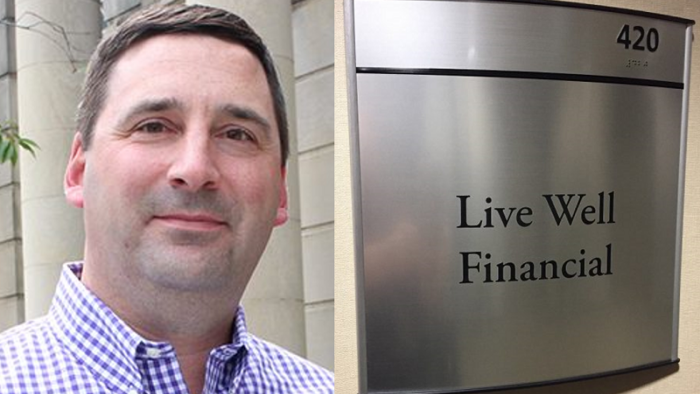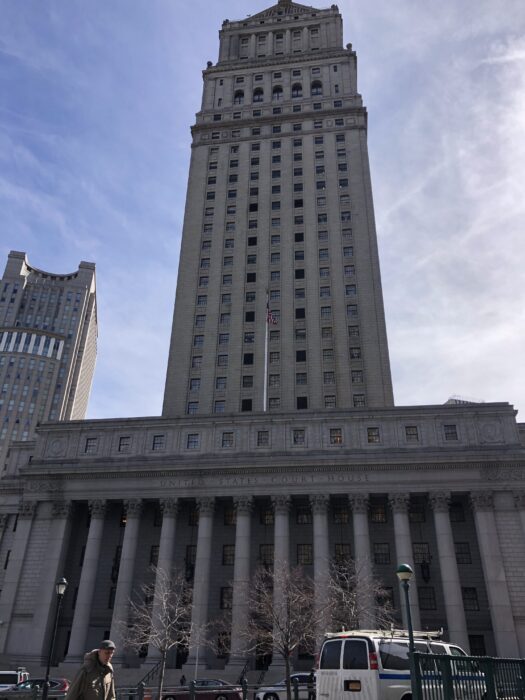The nearly two-year debate over how much criminal restitution embattled Richmond businessman Michael Hild must pay to his victims appears to have been decided.
U.S. District Court Judge Ronnie Abrams last week ordered Hild to shell out a total of $45.7 million to four lenders that were defrauded in a bond pricing scheme for which the former Live Well Financial owner was found guilty and is facing a nearly four-year prison sentence.
The $45 million will be divvied out among the quartet of banks based on their respective losses from Hild’s crimes, which involved his masterminding Live Well’s wrongful inflation of the value of reverse mortgage bonds as collateral to borrow millions more from the lenders than it otherwise could have.
The scheme led to the collapse of the once-fast-growing Chesterfield-based company as well as Hild’s arrest, trial and conviction. He’s been sentenced to serve 44 months in federal prison but has remained free on bond while appealing the guilty verdict.
Upon sentencing Hild in early 2023, Abrams delayed making a decision on a restitution amount so further evidence could be presented regarding the true losses for each of the lenders.
The U.S. Attorney’s Office initially called for $69 million in restitution, while Hild argued that the figure should be far less or even zero.
A magistrate judge appointed for the sole purpose of dealing with the restitution issue suggested $46.4 million earlier this year.
Ultimately, Abrams in her Sept. 23 ruling called for divvied-out restitution amounts of: $13.36 million to Flagstar Bank; $17.79 million to Industrial and Commercial Bank of China; $6.79 million to Mirae Asset Securities; and $7.64 million to Customers Bank.
She described the $45 million as “a reasonable approximation of losses supported by a sound methodology.” She said the difference in the amount of her order and that of the magistrate judge’s recommendation was based on adjustments made after reviewing additional evidence.
Abrams’ decision came despite Hild’s arguments that no restitution should be owed to Flagstar, Mirae and Customers Bank. He claimed that they and ICBC benefited financially from holding the bonds after Live Well’s bankruptcy and reaping the interest payments after they essentially foreclosed on those bonds as collateral for the loans to Live Well.
The lenders maintained they were harmed even after receiving some interest payments and proceeds from later selling the bonds.
Abrams said she found Hild’s objections largely “meritless.”
“The sale of the bonds reduces the amount of restitution Hild owes because the proceeds constitute returned property. But the sale itself did not cause the lenders’ losses. Hild’s conduct did,” Abrams said in her 27-page opinion. “Generally, where fraud causes an entity to loan money, that fraud is a ‘direct and proximate’ cause of the loss of that money.”
Hild must begin making the restitution payments immediately. They’ll be split into monthly installments of at least 20 percent of Hild’s gross income payable on the 15th day of each month.
Should he lose his appeal and his prison sentence be upheld, he’ll be required to make his payments while incarcerated through the Bureau of Prisons’ Inmate Financial Responsibility Plan.
A message left for Hild’s attorney, Brian Jacobs of the New York law firm Morvillo Abramowitz Grand Iason & Anello, was not returned by press time.
Hild’s appeal, meanwhile, is ongoing. He’s asked for the verdict and his 44-month sentence to be overturned. That case is playing out in the U.S. Court of Appeals for the Second Circuit.
The Live Well bankruptcy case also continues to play out in federal court in Delaware, where the trustee is in the midst of a long-running battle with Hild and his wife to recoup funds for the collapsed company’s creditors.
Hild felt additional fallout from the legal saga this summer when Virginia Credit Union, the main lender on most of his and wife’s real estate ventures, won a court battle to take control of some of the couple’s properties in the Manchester area.
VACU expects to eventually put those properties up for sale to earn back at least part of the money it is owed from Hild, his wife and their company Church Hill Ventures.
The nearly two-year debate over how much criminal restitution embattled Richmond businessman Michael Hild must pay to his victims appears to have been decided.
U.S. District Court Judge Ronnie Abrams last week ordered Hild to shell out a total of $45.7 million to four lenders that were defrauded in a bond pricing scheme for which the former Live Well Financial owner was found guilty and is facing a nearly four-year prison sentence.
The $45 million will be divvied out among the quartet of banks based on their respective losses from Hild’s crimes, which involved his masterminding Live Well’s wrongful inflation of the value of reverse mortgage bonds as collateral to borrow millions more from the lenders than it otherwise could have.
The scheme led to the collapse of the once-fast-growing Chesterfield-based company as well as Hild’s arrest, trial and conviction. He’s been sentenced to serve 44 months in federal prison but has remained free on bond while appealing the guilty verdict.
Upon sentencing Hild in early 2023, Abrams delayed making a decision on a restitution amount so further evidence could be presented regarding the true losses for each of the lenders.
The U.S. Attorney’s Office initially called for $69 million in restitution, while Hild argued that the figure should be far less or even zero.
A magistrate judge appointed for the sole purpose of dealing with the restitution issue suggested $46.4 million earlier this year.
Ultimately, Abrams in her Sept. 23 ruling called for divvied-out restitution amounts of: $13.36 million to Flagstar Bank; $17.79 million to Industrial and Commercial Bank of China; $6.79 million to Mirae Asset Securities; and $7.64 million to Customers Bank.
She described the $45 million as “a reasonable approximation of losses supported by a sound methodology.” She said the difference in the amount of her order and that of the magistrate judge’s recommendation was based on adjustments made after reviewing additional evidence.
Abrams’ decision came despite Hild’s arguments that no restitution should be owed to Flagstar, Mirae and Customers Bank. He claimed that they and ICBC benefited financially from holding the bonds after Live Well’s bankruptcy and reaping the interest payments after they essentially foreclosed on those bonds as collateral for the loans to Live Well.
The lenders maintained they were harmed even after receiving some interest payments and proceeds from later selling the bonds.
Abrams said she found Hild’s objections largely “meritless.”
“The sale of the bonds reduces the amount of restitution Hild owes because the proceeds constitute returned property. But the sale itself did not cause the lenders’ losses. Hild’s conduct did,” Abrams said in her 27-page opinion. “Generally, where fraud causes an entity to loan money, that fraud is a ‘direct and proximate’ cause of the loss of that money.”
Hild must begin making the restitution payments immediately. They’ll be split into monthly installments of at least 20 percent of Hild’s gross income payable on the 15th day of each month.
Should he lose his appeal and his prison sentence be upheld, he’ll be required to make his payments while incarcerated through the Bureau of Prisons’ Inmate Financial Responsibility Plan.
A message left for Hild’s attorney, Brian Jacobs of the New York law firm Morvillo Abramowitz Grand Iason & Anello, was not returned by press time.
Hild’s appeal, meanwhile, is ongoing. He’s asked for the verdict and his 44-month sentence to be overturned. That case is playing out in the U.S. Court of Appeals for the Second Circuit.
The Live Well bankruptcy case also continues to play out in federal court in Delaware, where the trustee is in the midst of a long-running battle with Hild and his wife to recoup funds for the collapsed company’s creditors.
Hild felt additional fallout from the legal saga this summer when Virginia Credit Union, the main lender on most of his and wife’s real estate ventures, won a court battle to take control of some of the couple’s properties in the Manchester area.
VACU expects to eventually put those properties up for sale to earn back at least part of the money it is owed from Hild, his wife and their company Church Hill Ventures.

